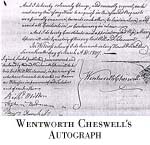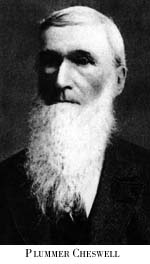

 Another Northern family, but one whose history reflects yet another set of sociological experiences and expectations, the Cheswells should prove an equally fascinating study of racial crossing. Furthermore, like those of Pendarvis and Drigger, the name Cheswell, despite its Anglo Saxon etymology, is nevertheless fairly conclusive proof that those who bear it are of African American extraction no matter what their ancestors' appearance to the contrary have been for the last two centuries.
Another Northern family, but one whose history reflects yet another set of sociological experiences and expectations, the Cheswells should prove an equally fascinating study of racial crossing. Furthermore, like those of Pendarvis and Drigger, the name Cheswell, despite its Anglo Saxon etymology, is nevertheless fairly conclusive proof that those who bear it are of African American extraction no matter what their ancestors' appearance to the contrary have been for the last two centuries.
Indeed, the very first Cheswell whom we can identify was the "negro" Richard, who is mentioned in a late 17th century New Hampshire record. What little we know of him is more than compensated for by the legacy his son, Hopestill, has left behind him. A master housewright of the Portsmouth area, two of the still remaining buildings he erected are today prized treasures of our national heritage. One, the John Paul Jones House has for years served as the office for the Hew Hampshire Historical Society while the other, the Samuel Langdon House, was moved to Sturbridge Village where, as one of this museum's central exhibits, it provides a superb example of the construction technology in which the northeast took justifiable pride during the 18th century.
Either because of the financial base he soon began to accumulate from his profession or his rather ambitious personality, Hopestill Cheswell must obviously have proved himself enough of a marriage prospect to overcome whatever reservations his neighbours might have harboured against him because of his colour. Unlike William Black Jr., his contemporary a few miles north of him in Maine, Hopestill was legally married and, to a young woman from a fairly respectable white family in the area. Furthermore, as Erik Tuveson, the author of a still unpublished paper on the first three generations of this family pointed out, blacks, as long their numbers remained comparatively small in relation to the white majority, were more apt to be perceived and treated as individuals. That Hopestill was fully aware of the potential prejudice his ethnic background might have inspired is related by an early New Hampshire historian. According to one of the few reminiscences recorded by a resident of Portsmouth who had actually known him, the owner of the house Hopestill had just framed invited his friends to the tavern to help him celebrate the occasion. What the anecdote so disconcertingly pointed out was the fact that Hopestill had not risked an embarrasing situation by assuming himself to be one of the intended guests. It was not until his client personally reached out to include him that he was able to drop his guard and join in the festivities.
Whether through his father's financial resources or, perhaps, even his own, Wentworth Cheswell, Hopestill's son, acquired a formal education. In 1763, when Lieutenant Governor Willam Dummer founded his Academy, this 16 year-old was one of the youths enrolled. Since most males during this particular period of history would have been wage earners by this age, it is quite possible that the younger Cheswell helped his parents defray the cost of his room and board at Dummer Academy in Byfield, Massachusetts. As Tuveson has pointed out, Wenworth Cheswell's education was "an unusual privilege for a country boy at the time. Few people of the colonial era were formally educated, mostly due to cost and lack of inexpensive public schooling. Education of any formal sort in colonial New England carried a significant degree of elite social status."
Whatever it was, the price was right. For in a state marked by "a deficiency of persons qualified for the various departments in government, there are few who know how public business ought to be conducted."
With both his wisdom and wit shaped and sharpened for him by a school master who had graduated from Harvard a few years before, Wentworth Cheswell's rise to social prominence and political power was pretty much assured.
From 1768, when he was elected constable until his death in 1817, this man of colour held a succession of town or local government positions. Besides serving as assessor, town auditor and coroner, he was also voted a selectman. From his appointment in 1805 onwards, Wentworth Cheswell would exercise the authority of Rockingham County's Justice of the Peace.
I suppose it should serve as a comment on the national mythology that what Wentworth Cheswell is most remembered for in New Hampshire history was not what he had been able to achieve as a person of colour. (And who knows, perhaps the element of race had never been that important to those who knew him. Especially, as Tuveson argues, being only a quarter African, he was almost as white as they were.) Instead, Wentworth Cheswell is honored as a Revolutionary hero rather closely modeled on the figure of Paul Revere. As the town messenger on the Committee of Safety during the Revolution, he too, had made an all-night ride back from Boston to warn his community of the impending British invasion.
 Because genealogies of the Cheswells, like those on the Gibsons, the Driggers, the Pendarvises and the Blacks, make no mention or allusions to their African origins, these publications provide us with examples of the "passing" process. No mention is made of his first immigrant ancestor. A Who's Who of the 1920s, for instance, described the founder of the Cheswell Cotton Mills in South Carolina as the descendant of the American Revolutionary Patriot, Wentworth Cheswell.
Because genealogies of the Cheswells, like those on the Gibsons, the Driggers, the Pendarvises and the Blacks, make no mention or allusions to their African origins, these publications provide us with examples of the "passing" process. No mention is made of his first immigrant ancestor. A Who's Who of the 1920s, for instance, described the founder of the Cheswell Cotton Mills in South Carolina as the descendant of the American Revolutionary Patriot, Wentworth Cheswell.
It should be noted that Wentworth Cheswell also was the subject of a national accolade which he had received during a Congessional debate in 1820 over the Missouri Compromise. In his address opposing the legislation that prevented mulattos from attaining Missouri citizenship, Senator Morril of New Hampshire stated that "In New Hampshire there was a man by the name of Cheswell, who, with his family, were respectable in point of abilities, property and character. He held some of the first offices in the town in which he resided, was appointed justice of the peace for the county, and was perfectly competent to perform with ability all the duties of his various offices in the most prompt, accurate and acceptable manner. But this family are forbidden to enter and live in Missouri."
Besides those who are readily identifiable by this name today, branches of the following old New England families can also claim Wentworth Cheswell Esq. as an ancestor:
Perkins
Hanniford
Chase
Smart
Bennett
Gillingham
Forsaith
Hastings
George
Flanders
|

 |
Rice
Chesley
Mathes
Watson
Burly
Nason
Pomroy
Stedman
Frisbee
Tufts (3rd cousin to the university founder)
|
Researched and Written by Mario de ` y Cocom.
|